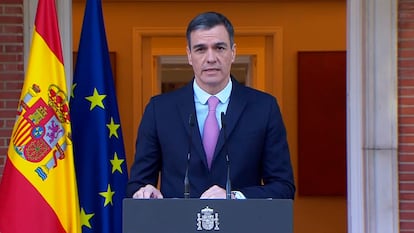Spain calls snap general election after right, far-right, inflict heavy local and regional defeat
The Spanish Socialist Workers’ Party suffered a dramatic electoral reverse in local and regional elections held on Sunday, triggering an equally dramatic response from Prime Minister Pedro Sánchez

The Spanish Socialist Workers’ Party (PSOE) suffered a dramatic electoral reverse in local and regional elections held on Sunday, triggering an equally dramatic response from Prime Minister Pedro Sánchez. The leader of the PSOE, who heads a leftist coalition government, has decided to bring forward the general elections slated for December to July 23, in order to minimize the risk of further wear and tear on his administration over the coming months after the country’s right wing was emboldened by its resounding successes on Sunday, and to try and prevent the right-wing Popular’s Party (PP) and the far-right Vox grouping from scoring a clean sweep during the ballot to elect a new government.
“I personally assume responsibility for the results and I feel it is necessary to give a response. Many prime ministers who have governed impeccably have ceased to be so. A clarification from the Spanish people as to who should lead this phase is needed. The best thing is for Spaniards to have their say to define the political course of the country,” Sánchez said during a brief appearance. An emergency Cabinet meeting is expected to legally ratify the prime minister’s decision to dissolve parliament and call an early general election on Monday afternoon.
Throughout his career, Sánchez has become accustomed to taking risky decisions, and now he has opted for the most perilous of them all, but also one no one anticipated on election night. The prime minister has now placed the onus back on voters, particularly the progressives, to decide almost immediately if they want to consolidate the result of the local and regional elections at the national level, or to mobilize to prevent a victory for the right.
Sunday’s elections saw Spain take a major swing to the right and made the leading opposition PP the main political force in the country. “This is unexpected,” said Ignacio Jurado, a political scientist at Madrid’s Carlos III University. “Sánchez is trying to short circuit the PP’s rise as soon as possible.”
In the municipal vote, the PP won 31.5% of votes compared with 28.2% for the PSOE, a 1.2 percentage point decrease for the Socialists over 2019, but almost a nine-point increase for the PP, which benefited from the collapse of the centrist Ciudadanos (Citizens) party.
The PP won in seven of the 12 regions contested and dominated in several regions previously won by the PSOE, including Valencia, Aragón and La Rioja. It remains to be seen whether the PP will have to rely on support from Vox to form regional governments.
In 2019 — also against the odds and at a time when he had been governing for just a few months after the successful no-confidence motion passed against PP then prime minister Mariano Rajoy in July 2018 — Sánchez also undertook a risky electoral advance, which consolidated the PSOE in power with a gain of 38 seats in parliament. At that time, the Spanish left mobilized en masse in the face of the threat posed by Vox, which had made a political splash by winning 12 seats and a place on the regional government of Andalucía in December 2018.
Four years later, Vox is no longer a hypothesis but a growing reality, according to Sunday’s results. The PP has also bounced back since 2019, when the party obtained its worst-ever results in both the general and regional elections. Now, the prospect of the PP governing in coalition with Vox is not something abstract, but almost a certainty. That is why Sánchez has decided to go all-in and play his hand now, to try and conjure a repeat of that extraordinary Socialist-leftist mobilization of 2019. The results of Sunday’s elections show the huge task facing Sánchez’s government and Spain’s left, which appears now to need a miracle to halt the conservative wave that has already swept through several European countries and has now arrived on the shores of Spanish politics.
Sign up for our weekly newsletter to get more English-language news coverage from EL PAÍS USA Edition
Tu suscripción se está usando en otro dispositivo
¿Quieres añadir otro usuario a tu suscripción?
Si continúas leyendo en este dispositivo, no se podrá leer en el otro.
FlechaTu suscripción se está usando en otro dispositivo y solo puedes acceder a EL PAÍS desde un dispositivo a la vez.
Si quieres compartir tu cuenta, cambia tu suscripción a la modalidad Premium, así podrás añadir otro usuario. Cada uno accederá con su propia cuenta de email, lo que os permitirá personalizar vuestra experiencia en EL PAÍS.
¿Tienes una suscripción de empresa? Accede aquí para contratar más cuentas.
En el caso de no saber quién está usando tu cuenta, te recomendamos cambiar tu contraseña aquí.
Si decides continuar compartiendo tu cuenta, este mensaje se mostrará en tu dispositivo y en el de la otra persona que está usando tu cuenta de forma indefinida, afectando a tu experiencia de lectura. Puedes consultar aquí los términos y condiciones de la suscripción digital.








































